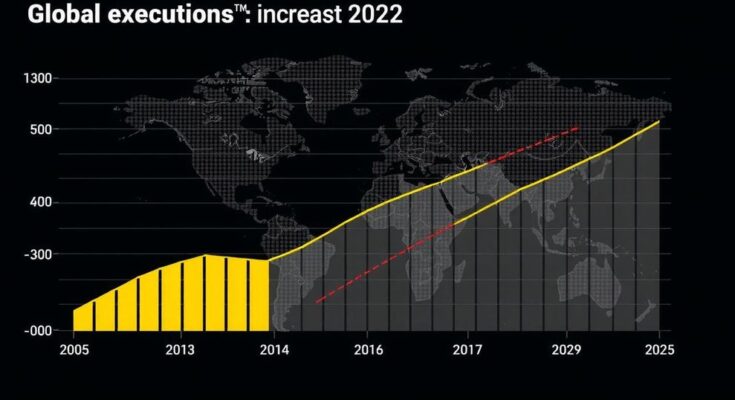In 2022, global executions surged by 53% from the prior year, with notable increases in Iran (83%) and Saudi Arabia (200%). Amnesty International highlighted concerns over Indonesia’s rising death sentences, predominantly due to drug offenses. The report signifies troubling trends in the application of capital punishment across 20 countries, calling for renewed discourse on human rights and legal reforms.
In 2022, global executions witnessed a staggering increase of 53% compared to the previous year, as documented in an annual report by Amnesty International. This surge is prominently attributed to significant rises in the rates of executions in Iran and Saudi Arabia. Amnesty’s report identified that Iran accounted for a staggering 70% of all executions within the Middle East and North Africa, with a notable increase of 83%, rising from 314 executions in 2021 to 576 in 2022. Similarly, Saudi Arabia experienced a threefold escalation in its execution count, from 65 in 2021 to 196 in the following year. Additionally, countries such as Kuwait, Myanmar, the Palestinian territories, Singapore, and the United States also reported increases in their execution figures compared to 2021. Overall, it is estimated that 20 nations executed a total of 883 individuals, a significant rise from 579 executions carried out by 18 countries in 2021. Amnesty International highlighted that the lack of transparency and restrictive practices in various nations, notably China, North Korea, and Vietnam, hindered a precise evaluation of the death penalty’s application in those regions. In Indonesia, the organization pointed out that 94% of the 112 new death sentences issued in 2022 stemmed from drug-related offenses. These crimes are categorized under international law as not meeting the threshold of “most serious crimes” and often do not involve intentional killing. The report indicated that Bangladesh had the highest rate of new death sentences in the Asia-Pacific region with at least 169 recorded, followed closely by India with 165, and Pakistan with 127. Indonesia maintains capital punishment for various offenses, including murder, terrorism, and severe drug trafficking, which is administered through firing squads. Notably, the last executions in the country were conducted in July 2016, where four individuals, including three Nigerian nationals, were executed for drug-related offenses on the prison island of Nusa Kambangan. Currently, Indonesia is home to over 450 individuals on death row, approximately 60% of whom are convicted drug traffickers, which includes 88 foreign nationals from 18 different countries. The report from Amnesty further revealed that China, Iran, Saudi Arabia, and Singapore collectively executed at least 325 individuals for drug-related offenses, over double the number from 2021. Furthermore, Amnesty reported that 112 countries have abolished the death penalty as of last year, including Papua New Guinea. Malaysia is also noted to have taken steps towards reforming mandatory death sentences.
The discussion surrounding capital punishment has become increasingly critical as global trends show a sharp rise in executions. Amnesty International’s annual report provides comprehensive insights into the current state of the death penalty, highlighting key figures and the implications of legal practices worldwide. The year 2022 saw particular escalations in countries like Iran and Saudi Arabia, which significantly impacted overall execution rates. Furthermore, the report emphasizes issues of transnational legality, particularly in the context of drug-related offenses, and the moral considerations inherent in the application of the death penalty in various jurisdictions. As countries grapple with human rights implications and legal reforms, the conversation continues regarding the effectiveness and ethics of capital punishment globally.
In summary, the 2022 report by Amnesty International sheds light on the alarming increase in executions worldwide, with a pronounced rise in countries such as Iran and Saudi Arabia. The stark statistics reflect a complex interplay between national laws, international human rights standards, and the ongoing debate regarding the death penalty. As Indonesia experiences an alarming number of new death sentences predominantly related to drug offenses, the need for global dialogue and potential reforms in capital punishment practices is underscored. As the international community collectively moves towards an understanding of human rights, the data presented in this report reinforces the necessity for critical examination of the death penalty’s application across various jurisdictions.
Original Source: www.pbs.org




